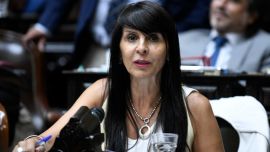The past 12 months will certainly be remembered for a horrible economic crisis and the stromy conditions that accompanied it, including soaring inflation, a massive devaluation of the peso, and the grinding to a halt of economic activity in Argentina. It didn’t even begin that well in retrospect: after a shotgun press conference in which Cabinet Chief Marcos Peña publicly discredited then Central Bank President Federico Sturzenegger, the value of the peso began a steady decline that eventually blew up into a total currency crisis that began in May, forcing President Macri to seek an emergency loan from the (in)famous International Monetary Fund (IMF). Sturzenegger, with the ink still wet on the IMF deal, resigned on June 14, after the peso nosedived 6.1 percent in a single day. Luis “Toto” Caputo took his place. Dubbed “the Messi of finance” by members of Macri’s Cabinet, Caputo lasted only three months at the helm, with the peso-dollar rate going from 28 pesos to the greenback to nearly 40 pesos during his tenure. By then, it was clear that the IMF was effectively taking over macroeconomic decision-making, delegating execution to Economy Minister Nicolás Dujovne and Guido Sandleris, Caputo’s replacement at the Central Bank. In the meantime, Argentina entered into a technical recession as interest rates shot to record levels above 60 percent, and inflation continued to climb higher to end the year near 50 percent. At least 120,000 jobs were lost in the year to October, according to the last available data, and GDP is expected to contract 2.8 percent in total this year (we are awaiting the final figures) and a further 1.9 percent in 2019, according to the OECD. The Macri administration has decided to turn its focus to cutting the fiscal deficit, hoping to eliminate it by the end of 2019, despite presidential elections where former president Cristina Fernández de Kirchner is expected to battle it out for a seat in the Casa Rosada. Already, the economy is casting a long shadow over the coming 12 months.
ECONOMY | 29-12-2018 09:12
Twelve months in which economic turmoil returned
The value of the peso began a steady decline that eventually forced President Macri to seek an emergency loan from the International Monetary Fund.
More in  (in spanish)
(in spanish)
 (in spanish)
(in spanish)

Lily Collins, protagonista de Emily in Paris (Netflix): “Mi personaje ya tiene voz propia y sabe cómo usarla”
Previous news of "Economy"
- Energy Secretary Javier Iguacel resigns after announcing utility bill hikes
- Public transport fares in Buenos Aires to soar in 1st quarter
- October slump: INDEC records seventh straight month of economic decline
- Argentine forensic team stops work after government halts funding
- Mapuche group files lawsuit against multinationals over pollution from Vaca Muerta















Comments